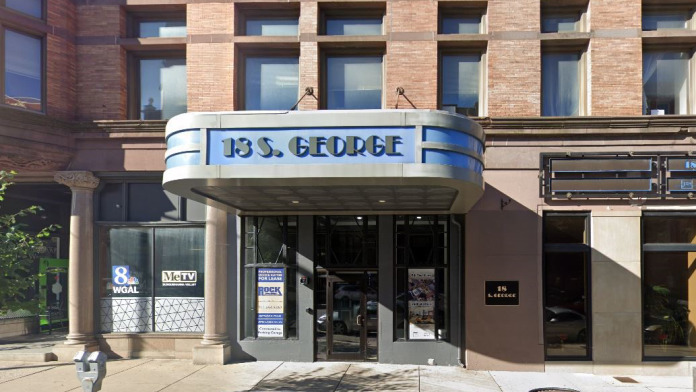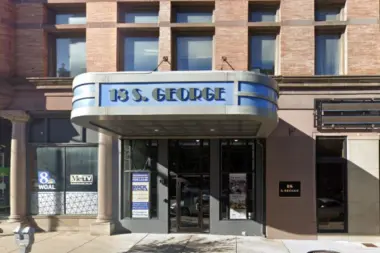About Pyramid Healthcare Inc. – York (Outpatient Treatment Center)
York Outpatient Treatment Center operates under Pyramid Healthcare. They provide outpatient addiction treatment services in York, Pennsylvania. The available levels of outpatient care include the partial hospitalization program and the intensive outpatient program. The facility accepts Medicaid and county funding to pay for treatment.
The Highest Level of Outpatient Care
The facility offers the highest level of outpatient care that you can receive, which is the partial hospitalization program. Your schedule will consist of multiple hours and days of treatment sessions while still being able to go home at night.
In addition to therapy sessions, other services that will be a part of the program include onsite yoga, holistic therapy and meditation. The treatment center offers walk in assessments throughout the week to determine if the partial hospitalization program or another level of care is an appropriate treatment for your needs.
Exploring History in York
York Outpatient Treatment Center is located near a variety of museums that can be fun places to go after your treatment sessions. You can visit the Agricultural and Industrial Museum that features antique cars that showcase the town’s manufacturing heritage.
Addiction Care Tailored To Legal Issues
Some clients may have legal issues that have occurred due to their substance use disorder. The York Outpatient Treatment Center offers an addiction awareness and DUI program. You’ll receive court ordered DUI services and treatment to help prevent future offenses from occurring.
During the program, clients will participate in evidence based therapies such as group education and individual counseling. The staff will ensure that all of the treatment you receive aligns with the legal requirements you need to follow.
Latest Reviews
Rehab Score
Gallery


Other Forms of Payment
Private insurance refers to any kind of healthcare coverage that isn't from the state or federal government. This includes individual and family plans offered by an employer or purchased from the Insurance Marketplace. Every plan will have different requirements and out of pocket costs so be sure to get the full details before you start treatment.
Self-pay involves paying for treatment out of your own pocket. You can use savings or credit, get a personal loan, or receive help from family and friends to fund your treatment. If you don't have insurance or your insurance plan doesn't cover a specific program, self-pay can help ensure you still get the care you need.
Financial aid can take many forms. Centers may have grants or scholarships available to clients who meet eligibility requirements. Programs that receive SAMHSA grants may have financial aid available for those who need treatment as well. Grants and scholarships can help you pai for treatment without having to repay.
Sliding scale payments are based on a client's income and family size. The goal is to make treatment affordable to everyone. By taking these factors into account, addiction recovery care providers help ensure that your treatment does not become a financial burden to you or your family, eliminating one barrier to care.
Medicaid is a state based program that helps lower-income individuals and families pay for healthcare. Medicaid covers addiction treatment so those enrolled can use their coverage to pay for rehab. When a program accepts Medicaid the client often pays very little or nothing out of their own pocket.
Addiction Treatments
Levels of Care
Outpatient programs are for those seeking mental rehab or drug rehab, but who also stay at home every night. The main difference between outpatient treatment (OP) and intensive outpatient treatment (IOP) lies in the amount of hours the patient spends at the facility. Most of the time an outpatient program is designed for someone who has completed an inpatient stay and is looking to continue their growth in recovery. Outpatient is not meant to be the starting point, it is commonly referred to as aftercare. Rehab After Work & Rehab After School offers various outpatient therapy skills support and therapy groups designed for those that have abused drugs and/or alcohol in the past but are no longer using them. Some of these groups include age-specific groups, gender specific as well as co-ed groups, early recovery skills groups and co-dependency groups.
These programs are designed for individuals that have been using drugs or alcohol and need frequent sessions to maintain abstinence. Some clients attend this outpatient addiction treatment program to gain control over their substance use problems before further inpatient treatment is required. Other clients attend this program as a step-down outpatient therapy option following an inpatient stay. During the client’s initial appointment or evaluation, they can help to determine which type of program is most appropriate and if an inpatient option is necessary, they can make recommendations at that time. Rehab After Work - South George Street's focus is on education, community building, and group therapy. Groups are kept to an average of 8 members so all individuals get the focus needed for successful outpatient therapy. Family members, parents, and/or support persons are required to be involved in the individual’s treatment and are counseled as well to help their loved ones succeed.
Clients receiving services from a rehab aftercare program are usually stable and in the maintenance phase of recovery, having completed detox and/or intensive inpatient treatment. Rehab aftercare services can vary widely based on clients' individual and evolving needs, but often include peer coaching, relapse prevention support, 12 step program induction, and medical, mental health, and social service referrals. Individual care plans are typically developed by the client in partnership with their case manager and care team.
Intervention services bring extensive experience to the planning and conducting of drug interventions in Pennsylvania. These experts can facilitate interventions in a sensitive manner that encourages positive outcomes. The goal of the intervention is to educate the individual about addiction and the consequences of their substance use and encourage them to get the treatment they need. Interventions can be effective with all types of drugs and alcohol addiction.
Treatments
The goal of treatment for alcoholism is abstinence. Those with poor social support, poor motivation, or psychiatric disorders tend to relapse within a few years of treatment. For these people, success is measured by longer periods of abstinence, reduced use of alcohol, better health, and improved social functioning. Recovery and Maintenance are usually based on 12 step programs and AA meetings.
Drug rehab in Pennsylvania is devoted to the treatment of addiction. Levels of care, treatment methods, and settings differ, but the aim of each program is to end drug dependency and empower participants to achieve long-term recovery.
In Pennsylvania, dual-diagnosis rehabs specialize in providing comprehensive care for individuals facing both mental health and substance abuse challenges. These facilities offer personalized treatment plans, integrating evidence-based therapies such as cognitive-behavioral therapy (CBT), dialectical behavior therapy (DBT), eye movement desensitization and reprocessing (EMDR), and experiential therapy. Other recovery services, like 12-Step meetings, skills training, educational groups, and an aftercare plan will enhance your odds of long-term recovery.
Programs
Adult rehab programs include therapies tailored to each client's specific needs, goals, and recovery progress. They are tailored to the specific challenges adult clients may face, including family and work pressures and commitments. From inpatient and residential treatment to various levels of outpatient services, there are many options available. Some facilities also help adults work through co-occurring conditions, like anxiety, that can accompany addiction.
Young adulthood can be an exciting, yet difficult, time of transition. Individuals in their late teens to mid-20s face unique stressors related to school, jobs, families, and social circles, which can lead to a rise in substance use. Rehab centers with dedicated young adult programs will include activities and amenities that cater to this age group, with an emphasis on specialized counseling, peer socialization, and ongoing aftercare.
Clinical Services
Cognitive behavioral therapy (CBT) in Pennsylvania can be helpful to individuals who are experiencing substance use disorder and various mental health conditions. It helps you identify damaging thought and behavior patterns and replace them with healthy ones.
Dialectical behavior therapy in Pennsylvania is an evidence based technique that involves group therapy, individual therapy, and phone coaching. Group sessions focus on learning behavioral skills. Individual therapy gives you the opportunity to apply what you're learning to your personal situations. Phone coaching allows you to call your therapist during the week for help with challenging situations.
Group therapy is any therapeutic work that happens in a group (not one-on-one). There are a number of different group therapy modalities, including support groups, experiential therapy, psycho-education, and more. Group therapy involves treatment as well as processing interaction between group members. Groups are kept to an average of 8 members so all individuals get the focus needed for successful outpatient therapy.
Individuals can seek individual outpatient addiction treatment therapy sessions at any time during the program. Clients are assigned a counselor and develop a needs-specific treatment plan. The frequency of visits per week will vary based on the individual’s needs. Appointments can be scheduled either during the day or in the evening.
Clinicians providing trauma therapy help clients recognize and identify how emotional and behavioral symptoms, such as flashbacks, guilt, shame, substance abuse, and a feeling of being overwhelmed, may be connected to a traumatic experience in their life. Subsequently, the clinicians helps the client identify positive coping skills, intentionally change thoughts and actions, develop strategies to reduce reactivity to the traumatic stressor(s).
Couples therapy in Pennsylvania is typically short term treatment that focuses on building skills that lead to positive long term relationship changes. Sessions with the therapist may occur both jointly and individually.
Research clearly demonstrates that recovery is far more successful and sustainable when loved ones like family members participate in rehab and substance abuse treatment. Genetic factors may be at play when it comes to drug and alcohol addiction, as well as mental health issues. Family dynamics often play a critical role in addiction triggers, and if properly educated, family members can be a strong source of support when it comes to rehabilitation. In addition to Rehab After Work - South George Street's family outpatient therapy offered as part of the IOP, family therapy sessions are provided as individualized family therapy for the specific client and their family members. These appointments will be made as requested by the client, family, or counselor during the day or evening hours. Family therapy appointments can be made for any type of family members.
Life skills are the mental and social skills that are necessary to navigate day to day life. Addiction diminishes or eliminates these skills, so they must be relearned and practiced during drug rehab treatment in Pennsylvania.
Incorporating recreational therapy into drug and alcohol addiction programs in Pennsylvania helps you rebuild your life and maintain sobriety by discovering new interests and developing healthy coping mechanisms. Recreational activities can include painting, team sports, and hiking to promote physical and mental health.
Artistic talent is not required to participate in creative arts therapy. This form of rehab treatment in Pennsylvania simply allows you to try different art media and use the one that works best for you to express yourself. The goal is not to produce quality art but to use the creative process as an outlet for recovery.
Amenities
-
Private Setting
Staff & Accreditations
Staff
Jeanimarie Goodwin
VP of Operations
Tyler Frederick
Senior Director of Marketing
Stephanie Thomas
Regional Director of Marketing
Holly Livingston, MSW
Regional Director of Marketing
Aleisha Albertson
Regional Residential Director
Kelly Salloum
Regional Residential Director
Katherine Beidel
Regional Outpatient Director
Accreditations

The Commission on Accreditation of Rehabilitation Facilities (CARF) is a non-profit organization that specifically accredits rehab organizations. Founded in 1966, CARF's, mission is to help service providers like rehab facilities maintain high standards of care.
CARF Accreditation: Yes
Contact Information
18 S George St
STE 401
York, PA 17401